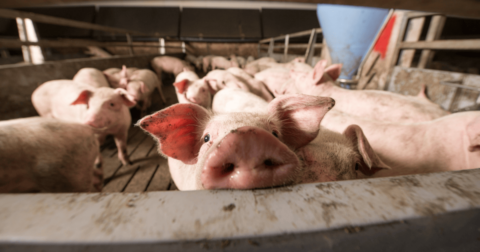Explainer
How the Meat Industry Shapes U.S. Politics (and Vice-Versa)
Law & Policy•11 min read
Reported
The new language would block states from regulating animal welfare on factory farms.


Words by Marlena Williams
Lawmakers in Washington, D.C. are hoping to introduce the long-delayed 2023 Farm Bill sometime this spring. The bill, which is the largest piece of farming-related legislation in the country, has been beset by months of political setbacks and infighting about the bill’s contents, and what they’ll mean for the future of American farmers. Between now and the bill’s passage, opponents of animal welfare legislation are reportedly looking to use the Farm Bill and the controversial companion legislation, the EATS Act, to negate California’s landmark law, Proposition 12, which went into full effect at the start of the year.
Proposition 12 prohibits the in-state production and sale of certain pork products sourced from pigs held in gestation crates and requires additional space for egg-laying hens and calves raised for veal as well. Though a majority of California voters approved the law in 2018, it faced several legal challenges in the ensuing years before eventually making its way to the Supreme Court in 2022.
The Supreme Court’s 2023 decision to uphold the law seemed to grant laws like Proposition 12, Question 3 in Massachusetts and, more recently, New Jersey’s ban on gestation and veal crates full speed to move ahead. Yet opponents — largely pork producers, agribusiness and their Republican representatives in Washington — are still trying to undo these crucial laws and, in doing so, to skirt around the democratic processes that put them in place.
From the EATS Acts to a newly introduced bill known as the Protecting Interstate Commerce for Livestock Producers Act, here is what we know about the latest attempts to block Proposition 12 and other crucial animal welfare laws across the country.
Shortly after the Supreme Court upheld Proposition 12 in 2023, Senator Roger Marshall (R-Kansas) introduced the Ending Agriculture Trade Suppression, or EATS, Act, into Congress. The controversial bill would prevent state and local jurisdictions from regulating the production and distribution of agricultural products within their borders. Though the law was clearly designed to block animal welfare laws like Proposition 12, it could potentially impact hundreds of other state and local laws that regulate animal welfare, food safety, public health and more.
“The EATS Act is a blatant attempt at trying to overturn the Supreme Court’s decision,” says Alex Cragun, the Director of U.S Government Affairs and Public Policy for Mercy for Animals. “But there hasn’t been much motion around Marshall and Hinson’s piece of legislation.”
The EATS Act was introduced in June of 2023 with the goal of making its way into the 2023 Farm Bill. The massive bill, which is passed every five years, encompasses everything from crop subsidies and farming practices to nutrition programs and rural development. Though farm bills typically pass in the fall, the 2023 bill was beset by numerous setbacks, thanks to a particularly dysfunctional Congressional term and the chaotic ousting of House speaker Kevin McCarthy. Lawmakers have continued to punt the appropriations process, which directs how the government and programs will be funded, further and further down the line. That process delayed pretty much everything in the House, including the Farm Bill and with it, the EATS Act.
However, the EATS Act is far from dead. Lawmakers have extended the 2018 Farm Bill’s expiration date until September 30, 2024. GT Thompson, the Chairman of the House Agriculture Committee, has announced that he plans to introduce a new Farm Bill to the House in March. That means proponents of the bill will be busy trying to get the language of the EATS Act, or at least a slightly narrower version of it, incorporated into the Bill this spring.
With the 2024 election rapidly approaching, lawmakers are no doubt feeling the pressure to pass the bill before the peak of election season. Negotiations are currently underway to get more lawmakers on board with incorporating either the EATS Act, or a slimmed down version of it potentially focusing on only meat and eggs, into the final Farm Bill. Though many lawmakers openly oppose the EATS Act, there may still be enough House and Senate members who are undecided or who support the Act for it to pass.
In September, a bi-partisan group of 211 lawmakers signed a letter opposing the bill, calling the proposed law a “particularly draconian” step that would “impede the ability of voters and elected officials to enact laws that address local concerns.”
“The Farm Bill is historically a piece of bi-partisan legislative cooperation between both sides of the aisle,” says Cragun. “Laws like the EATS Act overturn long-held precedents about regulating state and local agriculture.”
Over 100 groups, from the National Resource Defense Council to Farm Aid, have joined the Defeat Eats Coalition, and nearly 10,000 individuals have signed a petition opposing the bill.
“There is a lot of opposition to the EATS Act not only from people who care about the treatment of animals but from farmers who have already made the necessary changes at their complexes,” says Josh Balk, the Chief Executive Officer at the Accountability Board.
With Proposition 12 fully in effect, pork producers across the country, including major corporations like Hormel and Tyson, as well as grocers and restaurants like Albertsons, Chipotle and Niman Ranch, have all complied with the law and begun selling into the California market. Producers and companies that did the work of responding to the new welfare rules–whether that involved making minimal changes to their facilities or revamping their production systems altogether–are now being confronted with a new federal law that could wipe out their positive investments and allow the producers who did not comply to reap the benefits.
“Farmers that never used gestation crates in the first place are also not benefiting,” says Sarah Carden, a Senior Policy Advocate at the Farm Action Fund.
This kind of opposition is heightened by the fact that the largest producer in the United States, Smithfield, stands to gain from the EATS Act. Smithfield was purchased by the Hong Kong-based WH group for $4.7 billion in 2013, and continues to dominate the US pork market, representing around 530 Smithfield-owned farms and over 2,000 contracted farms. Smithfield has been criticized for widespread animal welfare violations, especially when it comes to the use of gestation crates, as well as for price fixing, polluting vulnerable communities, and its poor treatment of workers and contract farmers alike.
“Lawmakers have constituents who are multi-generational family farmers saying, ‘Listen, if you pass this law, you are helping a far-blown Chinese conglomerate over us,’” says Balk.
“By supporting the EATS Act or any other version of it, lawmakers are basically deciding that large pork industry players are more important than all the other agricultural producers in the country,” adds Carden.
On November 30th, Senator Josh Hawley (R-MO) introduced S.3382, or the Protecting Interstate Commerce for Livestock Producers Act, which would prohibit any state or local jurisdiction from passing any law that regulates livestock production if those livestock-derived goods are subject to interstate commerce. If passed, any state or local law that impacts how livestock is raised, produced, used, slaughtered, transported, distributed or sold could violate federal law.
If that sounds like a regurgitated version of the EATS Act, it basically is. The Protecting Interstate Commerce for Livestock Producers Act is slightly narrower than the EATS Act, in that it focuses solely on livestock rather than on all agricultural products, but its effect would be more or less the same: overriding any state or local law that aims to improve the lives of farmed animals.
Many critics and legal scholars have criticized the EATS Act for being overly broad and sweeping far too many crucial state and local laws into its purview. The hope for the proponents of Hawley’s bill–be they pork producers, agribusinesses or the lawmakers who represent them–is that a slightly narrower version of the EATS Act would be more palatable and could eventually make its way into the Farm Bill, whenever it is passed.
But opposition to this kind of legislation remains strong. Whether you care about protecting animal welfare, protecting American farmers, or protecting democratic precedent, the dangers posed by EATS or similar legislation should not be taken lightly.
“People on both sides of the political spectrum just don’t accept the premise that animals should be held in cages so small they can’t turn around,” says Balk.
Again and again, voters have shown this preference at the ballot box, voting into place historic animal welfare laws by wide margins and pushing producers and suppliers to implement more humane approaches in turn. Laws like the EATS Act and the Protecting Interstate Commerce for Livestock Producers Act attempt to bypass this process in favor of a select number of agribusinesses who aren’t willing to make the changes that many of their competitors have already done.
“Animal welfare legislation like this would overturn and roll back decades of progress in anti-confinement legislation,” says Cragun. “It is a very concerning and existential threat to the animal protection movement.”
But if this type of legislation comes into being, it could pose a concerning and existential threat to democracy as well.